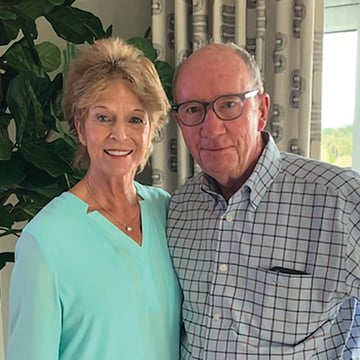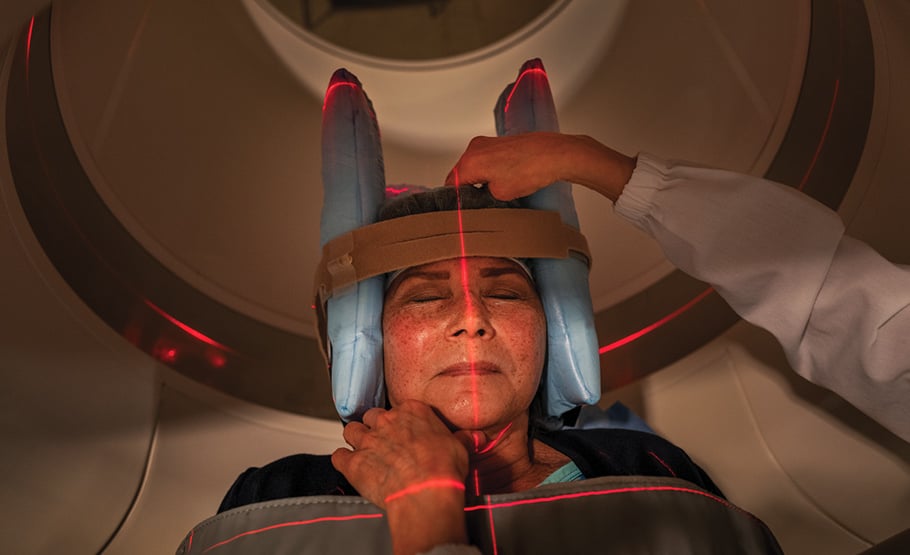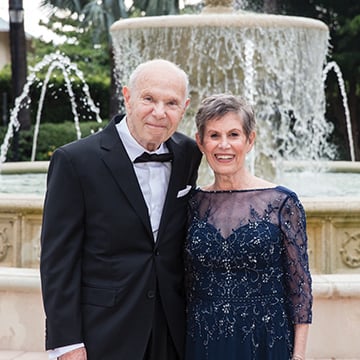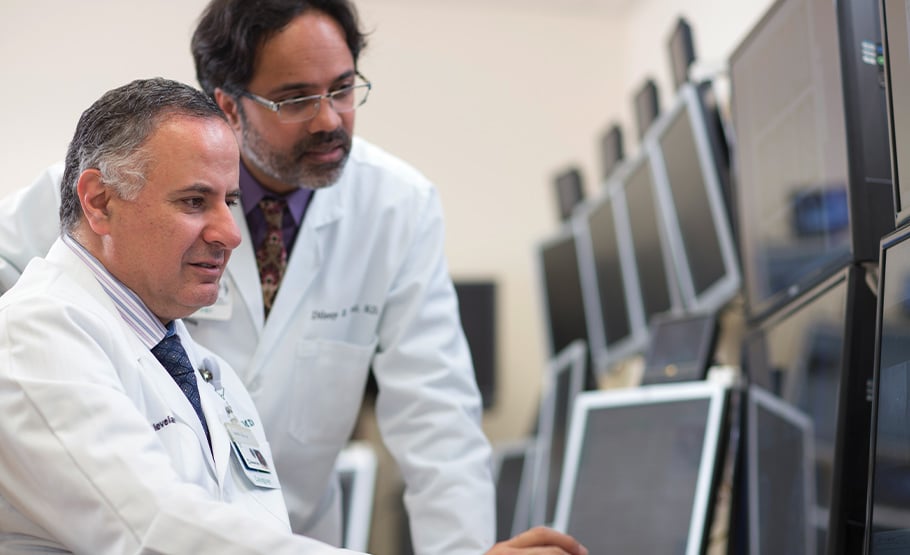Brain Gain
Cleveland Clinic launches a landmark study to find cures for neurological diseases
COVER STORY
By Kari Abitbol
Dr. Andre Machado (at right), Chair of Cleveland Clinic’s Neurological Institute and the Charles and Christine Carroll Family Endowed Chair in Functional Neurosurgery, performs deep brain stimulation surgery. | Photo: Stephen Travarca
One minute, she’s regaling you with childhood stories in exceptional, cringeworthy detail. The next, she casually asks who you are and where she is.
His legs spin over the bed as he prepares for the morning walk that’s been part of his routine for nearly 20 years. When his feet touch the ground, he feels paralyzed — unable to move, as if his feet are glued to the floor. His heart sinks, knowing another piece of his independence has been stolen.
-
On Friday, she’s feeling on top of the world after landing a business deal she’s worked toward for years. When she wakes up on Saturday, her mind fills with harmful ideations and overwhelming anxiety.
-
Scenes like these play out every minute of every day across millions of households worldwide. Families grieve for loved ones while they’re still alive. They feel powerless as a parent who should be enjoying retirement must spend it in a rehab center. They fight what feel like fruitless battles against mental torment. And they navigate the financial strain of unrelenting, progressively debilitating diseases.
These realities motivate Cleveland Clinic Neurological Institute doctors as they tackle one of the greatest scientific challenges in modern history.
One in every 6 people around the globe has a neurological disorder. Neurological diseases have upended millions of lives across the world and threaten countless more in the future.
With the Cleveland Clinic Brain Study, the Neurological Institute is on a mission to change the fate of patients with neurodegeneration once and for all. While the medical community has learned to manage some symptoms of some brain disorders, no one knows how to predict who will get sick — and no one knows how to cure these diseases once they’ve taken hold.
The Cleveland Clinic Brain Study is an unprecedented large-scale undertaking to answer these unknowns and to cure neurological diseases in their earliest stages, years before symptoms are obvious. It’s reaching further than any hospital enterprise, university system or research organization has before to prevent neurodegeneration.
By the time neurodegenerative diseases are diagnosed, it’s often too late. There is irreparable damage to the brain, and the greatest opportunities for a cure are lost. The Cleveland Clinic Brain Study can’t turn back the clock for these patients, but it could soon change the outcome for future patients with brain disease, for generations to come.

DONOR SPOTLIGHT
Charles and Christine Carroll moved from Ohio to North Carolina several years ago, but they still travel to Cleveland Clinic periodically for Charles’ Parkinson’s disease treatment. Their support for brain disease research also stems from watching Christine’s mother lose her battle with amyotrophic lateral sclerosis (ALS) and friends struggle with Parkinson’s disease.
“It seems there hasn’t been much change for neurological disorders in a lot of years,” says Christine. She and Charles share Dr. Machado’s enthusiasm for the Cleveland Clinic Brain Study’s potential to uncover effective Parkinson’s disease treatments that are tailored to each patient. “That’s really what I liked when Dr. Machado presented it to us — that individual, one-size-does-not-fit-all approach,” says Christine. “Just hearing Dr. Machado talk about it revs you up.”

A caregiver prepares a patient for a PET (positron emission tomography) scan of the brain at Cleveland Clinic Lou Ruvo Center for Brain Health in Las Vegas. | Photo: Scan: Lynn Johnson
The Largest Clinical Study Ever for Brain Disease
The Cleveland Clinic Brain Study is charting an entirely different path to treat neurodegeneration. Led by Andre Machado, MD, PhD, and Imad Najm, MD, of the Neurological Institute, the study will be an enterprisewide undertaking, enlisting a multidisciplinary team of physicians and scientists from across Cleveland Clinic’s global health system embracing the “team of teams” approach that is a hallmark of Cleveland Clinic’s identity.
Dozens of ongoing studies across the world screen biological material such as urine, blood and tissue to examine how genetic factors contribute to neurological diseases. Though these biorepository studies produce a wealth of data about the factors associated with brain disease occurrence, they can’t definitively say what causes disease to develop. After months of brainstorming whether and how they could use existing data, Dr. Machado and Dr. Najm determined that only a highly curated study could pinpoint the causal underpinnings of brain disease.
To learn what happens in the brain in the very early stages of disease, the Cleveland Clinic Brain Study would require following select individuals over time to track changes in the brain and in the body. In operating like a gigantic clinical study, the Cleveland Clinic Brain Study will answer a key problem in neuroscience: predicting which individuals will get sick so that disease can be diagnosed and prevented before symptoms present.
Enrolling tens of thousands of volunteers over its duration, the study initially will recruit healthy adults 50 years and older (the age when patients become at increased risk of developing neurodegenerative disorders). While most clinical trials seek patients within a certain disease population, the Cleveland Clinic Brain Study will issue a broad call to those without — but at risk for — brain disease. As a global healthcare institution with operations in Canada, London, Abu Dhabi and multiple parts of the United States, Cleveland Clinic has access to a significantly diverse subject pool across ethnic, racial and socioeconomic backgrounds — diversity that’s crucial in broad population research. “We want to recruit from our communities, and we want our recruitment to be diverse,” says Dr. Machado, Chair of the Neurological Institute and the Charles and Christine Carroll Family Endowed Chair in Functional Neurosurgery. “We’re seeking volunteers so that we can draw conclusions that will inform how to better care for all.”
The first phase of the study will enroll 10,000 volunteers who will be examined over the course of five years. These volunteers will undergo yearly neurological assessments, including blood work, eye retina scans, brain MRIs, stool samples, sleep studies and other cognitive function tests. Statistical estimates indicate that 3,000 volunteers will develop a neurological disease like Alzheimer’s disease, Parkinson’s disease, stroke or epilepsy by the end of the study’s initial five-year period. If the study meets this recruitment threshold, Dr. Najm expects it will be the key first step in identifying and validating the right biomarkers (or disease indicators) for accurate diagnosis.
“When we talk about the promise of precision medicine, this is its ultimate execution,” says Dr. Najm, Director of Cleveland Clinic’s Epilepsy Center and the Joseph H. and Ellen B. Thomas Endowed Chair in Epilepsy. “We’re building a foundation to screen one person at a time — potentially with something as routine as a blood test — to diagnose brain disease on the spot and prevent it from happening altogether.”
The Cleveland Clinic Brain Study is an unprecedented, large-scale undertaking to answer these unknowns, with the long-term goal of curing neurological diseases in their earliest stages, years before symptoms are obvious. It’s reaching further than any hospital enterprise, university system or research organization has before to prevent neurodegeneration.
“The Cleveland Clinic Brain Study will make Cleveland Clinic the organization known for changing the status quo of neurological disease,” says Dr. Machado. “This study will, over time, make Cleveland Clinic’s legacy in neurological disease match the legacy it already has in cardiovascular disease.”

DONOR SPOTLIGHT
When Sandy Fox, DDS, was diagnosed with Parkinson’s disease five years ago, he committed to taking every prescribed step to slow its progression. Yet his symptoms persisted with increasing intensity. When he came to Cleveland Clinic’s Neurological Institute, he and his family were impressed by the team’s comprehensive care across both the physical and psychological expressions of his disease.
Given Cleveland Clinic’s vast body of research and in-house scientists, Dr. Fox is confident the Cleveland Clinic Brain Study will lead to a better quality of life — and ultimately a cure — for patients with neurological disease. He hopes to enroll in the study and contribute to groundbreaking research that will uncover commonalities between Alzheimer’s disease and Parkinson’s disease to stop the progression of both.
“Those who can give should give,” says Dr. Fox, seen here with his wife, Sheila. “If I can help others in a similar situation, I will.”
An Opportunity to Cure Neurodegeneration
Researchers are not looking for just one smoking gun that pinpoints when and why neurological disease develops. For instance, when Alzheimer’s disease patients experience memory decline, it’s seldom. because of a single problem — but rather the aggregate of many neurological changes from protein accumulation to blood flow. The study’s objective is to identify how those factors are working together before neurological decline becomes apparent.
Using advanced computing tools, researchers will collect trillions of data points from the study volunteers. Collectively, these data points will form a trendline to capture the invisible, molecular changes in the brain over time. “Once we know which subjects developed disease and which didn’t, we can rewind the movie to find out what happened in the silent phase to determine what was normal, age-related change and what wasn’t,” says Dr. Machado. “And the moment we identify as the ‘when’ for these critical changes will become a new window of opportunity to treat people.”
Researchers will seek “disease fingerprints” to help guide diagnostic and preventative medicines. “We’re going to find a protein, a molecule or a gene that is associated with a certain type of disease, and that will be our target for intervention,” says Dr. Najm.
“The Cleveland Clinic Brain Study will make Cleveland Clinic the organization known for changing the status quo of neurological disease,” says Dr. Machado. “This study will, over time, make Cleveland Clinic’s legacy in neurological disease match the legacy it already has in cardiovascular disease.”

DONOR SPOTLIGHT
Though they haven’t experienced brain disease firsthand, Bob and Susan Hurwitz are no strangers to its devastating impact. Bob and Susan have been close friends with Dr. Sandy Fox and his family for nearly five decades, and two of Susan’s family members were also treated by Cleveland Clinic’s neurological team. Susan’s father had early-onset Alzheimer’s disease, and her sister was diagnosed with multiple sclerosis at 18 years old. Susan and Bob are grateful for the extensive care their loved ones received throughout their illnesses.
“The human brain is the last uncharted territory we have in the medical realm,” says Bob. “I’m convinced Cleveland Clinic is uniquely equipped with the right team and the right resources to find out what we don’t know about brain disease. If you truly believe in miracles, Cleveland Clinic is the place to start, and the Cleveland Clinic Brain Study is our best chance.”

Dr. Imad Najm (left), Director of Cleveland Clinic’s Epilepsy Center and the Joseph H. and Ellen B. Thomas Endowed Chair in Epilepsy, and Dr. Dileep Nair monitor the brain activity of patients with epilepsy. | Photo: Dr. Najm and Dr. Nair: Russell Lee
The Promise for Patients
Brain disease comes in many forms, from neurodevelopment delay and muscular impairment to memory decline and sleep disorders. Researchers are convinced that the connections between these diverse manifestations will uncover breakthroughs that are promising for many areas of neurological disease. “By using advanced tools that track brain wave activity, we may see clues that help us untangle depression, anxiety, autism and even migraines through connections between multiple areas of the brain,” says Dr. Najm. Because the Cleveland Clinic Brain Study will focus at first on adults 50 years and older, Dr. Machado and Dr. Najm anticipate that they may discover why some people develop major depression — a disease that presents more of a risk with age.
“We may also discover why people have strokes, why people have seizures and why people become depressed,” says Dr. Machado. “Our primary aim is neurodegeneration, but the architecture of our data collection will capture that insight, too.” In fact, changes in mood pose a major red flag for neurodegeneration. While not everyone who has depression will develop neurodegenerative disease, depression presents when there’s a significant chemical imbalance in the brain. It may be one of many events that contribute to the development of Alzheimer’s disease.
“If we can prevent even 10% of Alzheimer’s or Parkinson’s cases from developing or disabling strokes and seizures from occurring, that’s a major win — particularly because we really don’t have many wins in the neurological space at this point,” says Dr. Najm.
Dr. Machado and Dr. Najm plan to share the unique knowledge that will arise from the Cleveland Clinic Brain Study with the scientific community at large. By publishing in premier, peer-reviewed journals with global reach, they will ensure researchers and developers across the world can use their findings as a starting point in treating neurological disease. “Cleveland Clinic will begin to develop therapies, but we won’t be the only ones,” says Dr. Machado. “We’ll be well-positioned to develop new treatments, but I hope that major pharmaceutical companies will also seize the opportunity to better target drug development to the presymptomatic phase of brain disease.”
With philanthropic contributions to support these efforts, the Cleveland Clinic Brain Study has the potential to change the fate of those with brain disease in our lifetimes. “This type of study cannot and will not be funded initially by pharmaceutical companies or governments, so the only mechanism is through private philanthropy,” says Dr. Najm. “We’re counting on donors to help us alleviate suffering for the 1 in 3 of us who will develop neurodegenerative diseases in our senior years and potentially for the 1 in 6 of us who struggles with other forms of brain disease. Rather than building more nursing homes and chasing after a staggering mental health crisis, we can lessen the enormous financial, emotional and societal toll by disrupting these diseases once and for all.”
